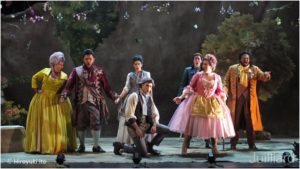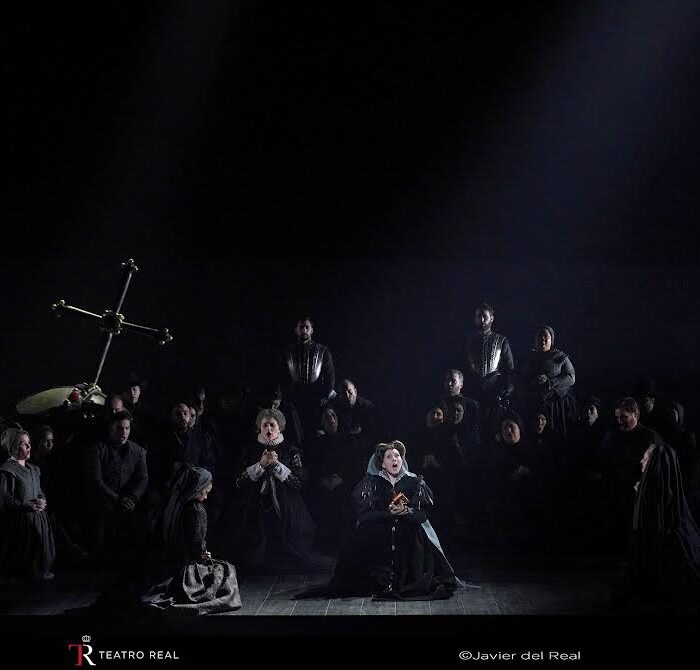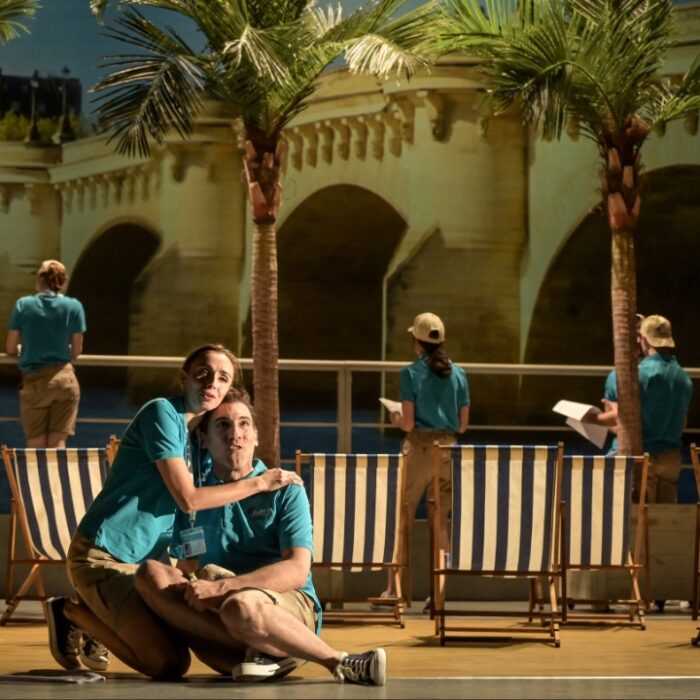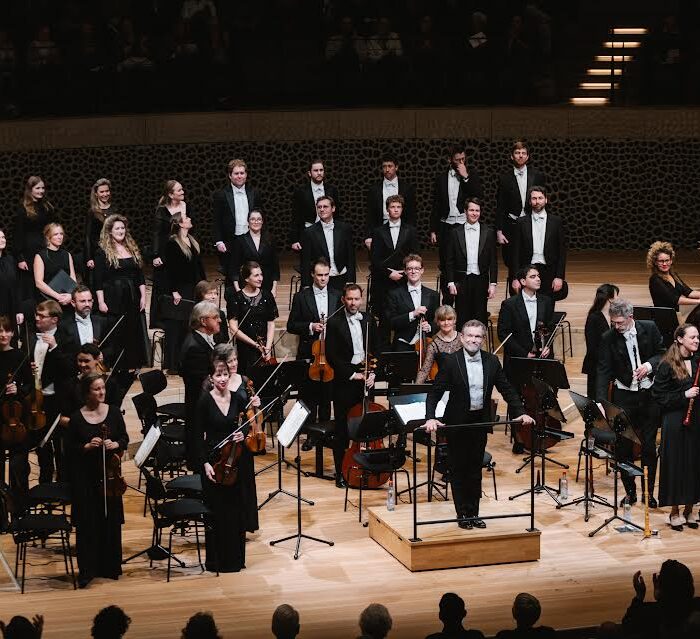
Juilliard Opera 2017-18 Review – La Finta Giardiniera: Mozart Comedy Gets Remarkable Production With Rising Stars
By Jennifer PyronDespite fall’s chill blanketing Manhattan, opera-goers are delighting in the light-hearted comedy in Juilliard’s production of Mozart’s “La Finta Giardiniera.”
Composed when he was just shy of turning 19, Mozart indulges in the fiery emotions that stir a garden party, gathered at the house of a small-town mayor. The opening scene reels in the listener while two maids whisper about the mayor acquiring a new and suspicious gardener, Sandrina. She arrived with a man named Nardo in tow, and this sets up the opera with a skeptical buzz.
Olivia McMillan and Joan Hofmeyr set the tone by dramatically telling about the arrival of these two new hires in an almost limerick style format spoken in English, before the opera begins. Both sopranos were on point with their deliveries and when the orchestra started, there was an air of excitement and wonder. With most of the cast on stage partaking in a fun garden party, it was easy to see what the orchestra brought to life through its delightful ebb and flow. Joseph Colaneri, who makes his Juilliard debut, seemed to thoroughly enjoy conducting from the start, exuding Mozart’s overall idea of creativity and exploration. Colaneri’s presence was pure joy and his delivery raised the bar for this season at Julliard.
Lively Stage Props
Energetic and alive, Grace Laubacher’s ordinary stage props were creatively presented in a pop-up book style garden that added the perfect amount of comedy for each character to play into while delivering their opening phrases. At one point, Arminda’s servant, played by William Guanbo Su, carries a white horse onto the stage and toys with its nodding head and responses to Arminda’s boisterous tone. Most of the cast found connection with his or her prop and helped bring to life the already luscious colors of the garden, while some eased into the idea and showed confidence later in the show, especially when surrounded by suspended bouquets illuminated by glass bulbs.
Fruitful Cast
Podesta, played by tenor Joshua Blue, immediately caught the ears of everyone and planted a seed of church giggles when he perfectly depicted his character’s manner of flattery towards Sandrina. His facial expressions, instinctual sense of humor and voice were superb. Blue is currently a second-year master’s student at Juilliard and is turning heads in this production with his overall performance. While his character ardently confesses his admiration towards Sandrina, soprano Tamara Banješević, the audience openly laughed, which created a sense of ease.
Playing along with the overly dramatic Podesta, Mozart introduces Ramiro as an overtly sappy character that adds more gloom and doom to the mix. This pants role is proudly played by mezzo-soprano Marie Engle. At points, Marie’s higher range glitters and breaks away from her middle range, which made for a treat to experience coming from a mezzo.
Comic relief and strong vocal technique were also found in Kathryn Henry’s role as Arminda. When she brags about marrying Count Belfiore, the audience admires her direct approach both in character and in vocal tone.
Her distant admirer, Nardo, is played by Jacob Scharfman who is most expressive in his movements, which is sometimes difficult for an opera singer to grasp. Both sopranos, Kathryn Henry and Christine Price also maintained a constant flow in their movements, which tied it all together for the casts’ comical yet organized approach.
Throughout the production, each singer was a direct reflection of Blake Habermann’s expertise. Having completed a professional program at L’École Jacques Lecoq in Paris, Habermann’s style matched seamlessly with Mary Birnbaum’s direction. The palpable emotions and frustrations that all of the lovers in this opera project are cleanly and clearly portrayed in an elevated style. Anshuman Bhatia’s lighting design was also very much in line with the overall theme. Scenes in the second act were a much-anticipated change of demeanor all around and were stunning. Colors such as tangerine, millennial pink and turquoise on a simple sheer sheet that extended from the stage’s ceiling created a very moving and intimate space for the singers to express their undying love and anguish in a tumultuous love affair.
Flowering Lovers
It was during the second act that Banješević blossomed into her role too and left listeners reveling in her rich and seductive vocal tone. During the scene where the stage and hall go dark, imitating a wilderness, the production depicted a lucid dream-like sequence that showed the cast’s camaraderie. Each voice was heard and projected at the right moment and really tied into the scene of being lost in the dark, together. Charles Sy, as Belfiore, followed Banješević’s strong lead and both blended nicely as they shared intimate and often very heated phrases. Sy developed his role in the second act and was seen as an overall artist enjoying the simple joy of expressing and creating in the moment. There was a particular scene where Banješević is being delivered and then pulled in and out of shadows by the cast that is gripping. The play of shadows, light battling dark, and the depth of her tormented heart is felt strongly by the audience. Even with all of the movement and quick changes of direction, Tamara never falters in her vocal technique. Together, the cast raised the caliber with this performance and left the audience in anticipation for another show.
In essence, the Juilliard Opera put on a fulfilling performance of a Mozart treat that often gets overlooked at larger companies.


